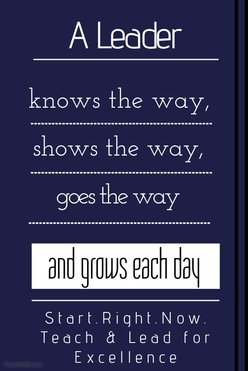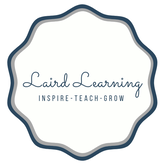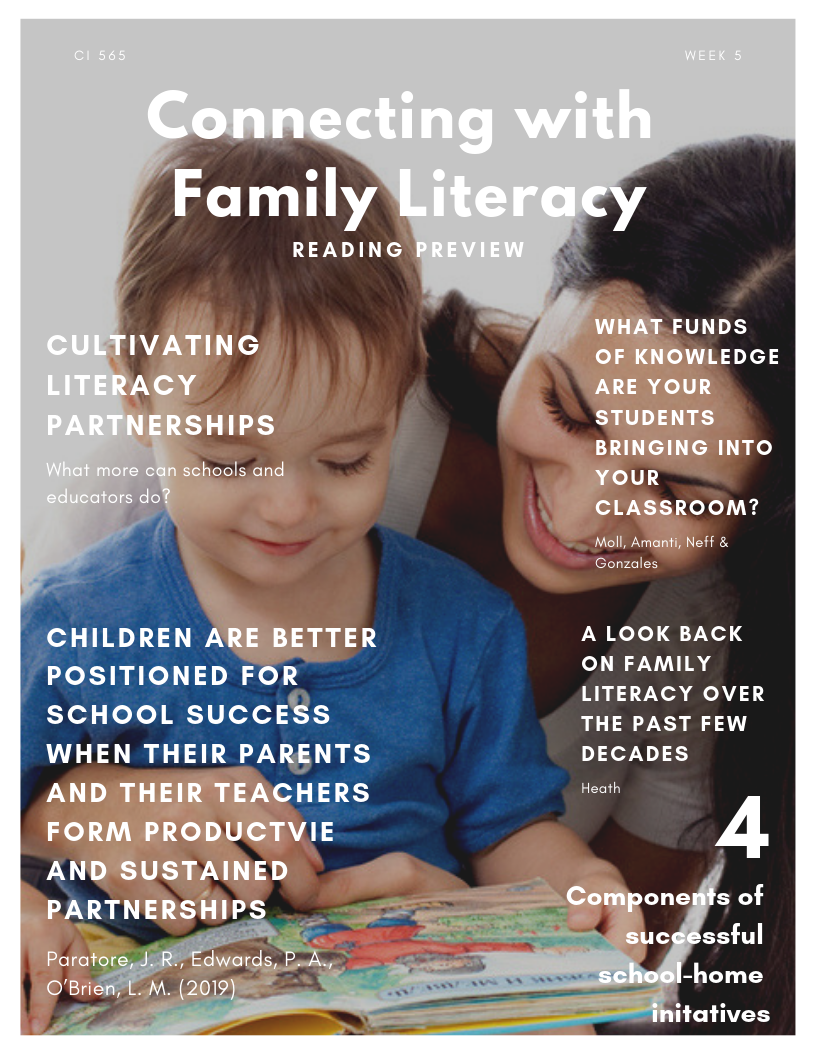|
As part of my CI 565: Literacy: Connecting Research, Policy, and Practice course, we lead a week's discussion. The focus of my week was Connecting with Family Literacy and included four readings:
To kickoff our study and discussion, I created the Reading Preview graphic below.
0 Comments
I was recently interviewed for a Literacy Today article focused on building a culture of literacy. The article can be found in the July/August 2017 edition of Literacy Today. Below you will find my responses to the interview questions: In your mind, what does it mean to have a culture of literacy in a school? A culture of literacy is when students, teachers, administrators, and support staff have a shared vision of what literacy is and why it is important. In addition, teachers and administrators rely on research-based instructional practices and data to make decisions and support students in their literacy journey. Finally, literacy is not something that occurs during a specific time of day or content area, but rather is infused throughout a student’s daily learning experience. What is the coach's role in this process and are there strategies that can help to get teachers on board in creating that culture? Coaches are there to support, model, and facilitate literacy instruction and data informed decisions. Although a coach is a literacy leader, it is important that the coach isn’t the only literacy leader, and that they are not viewed as the expert. If the coach is to be effective and the culture of literacy to be the norm, the coach must build the capacity of the teachers they support. What practices have worked in your school? And what hasn't worked? What has worked: Cultivating a shared vision, developing shared leadership, meeting teachers where they’re at in their understanding of literacy instruction, professional needs, etc., having a building or site-based coach, high functioning PLCs, using data to problem solve and inform instruction What doesn’t work: Drive PD with no follow through or application time, forgetting to share the “why” behind a PD or research-based instructional practice What is the role of a principal or district-level official in encouraging this approach in schools? Is it something that is more likely to develop if it isn't mandated, or district-led? A principal or district-level official is there to support the establishment of the literacy culture. They are co-learners in this process, and because the culture of literacy is important, they will make sure that time (instructional and professional development wise), funds, and resources are allocated. I think it could be developed if it isn’t mandated, but if it is done in such a way that it’s the way we do business, all stakeholders will recognize the need and rather than it being viewed as an initiative being done to the teachers, it will be seen as a collective effort to better the lives of our students. What a culture of literacy looks like: Throughout the day, you would see students reading, writing, speaking, listening, and creating. Teachers, no matter the content area, are engaging students in literacy. When you enter a classroom, there's a buzz! Students are co-constructing knowledge by using available resources (books, websites, videos, experts, etc.), they are immersed in a print-rich environment, the classroom library has high interest and developmentally appropriate books, and the teacher is meeting with students individually, in small groups, and as a whole class. Our students have access to books throughout the building, whether it's in their book boxes, the classroom or school library, or the bins of books located in the halls, office and common areas. Students are publishing writing to authentic audiences (outside the classroom or school walls) Teachers, principal, and all support staff model being readers and writers. I made "What is _____ (insert staff member's name) Reading. What are you reading?" posters for everyone to post outside their classroom doors. This allowed students to see the adults in their lives as readers too. Also, when students are writing/reading, the teachers are doing the same. As a coach, what strategies have you used to build a culture of literacy: This year I added P.O.P. teams (Peer Observation Partnerships) to our building. They're partnerships between two teachers where they informally observe one another throughout the year, noting evidence of our district's literacy framework and literacy strategies we've introduced in PD, and they reflect on what's working and discuss areas for growth. Last year, after reading Read, Write, Lead, I had our staff write down their top 3 literacy beliefs and then we came to a collective agreement about what our building's top 3 beliefs were. Recognizing your beliefs shape your actions, we were able to further cement our culture of literacy by identifying action steps we will take to ensure our beliefs come true for our students. These actions included: read alouds at least once every day, daily providing students time to read a book of their choice, publishing writing to an authentic audience, using mentor texts and holding reading and writing conferences with each student, incorporating writing to learn and accountable talk in all subject areas, and that every teacher is a literacy teacher. I serve one elementary building, so I am easily accessible to every teacher in the building to facilitate coaching cycles, model, co-teach, co-plan, and analyze data. I also strive to be visible throughout the day, and visit classrooms on a daily basis. During these informal visits, I am able to take note of areas of implementation, and what needs to be focused on either in a one-on-one conversation, grade level PLC meeting, or whole staff PD. I wrote a grant to send home monthly literacy bags that contain a new book and a reading activity parents can use with their child at home. These books are kept by the families with the goal of building up their home libraries. I also added a Little Free Library in front of our building, and love seeing children and their parents borrowing books. I'd love to hear, what have you done in your building or district to nurture a culture of literacy? I have been looking for ways to increase collaboration and provide teachers with authentic opportunities to lead and learn from one another. This year I introduced POP Teams (Peer Observation Partnerships), and for the first half of the year they seemed to work well. One of the biggest drawbacks of POPs was teachers wanted to collaborate with more than just their chosen parter. I also noticed the level of peer coaching wasn't where I would have liked it to be, and the number of instances where teachers went in to visit another classroom was small. One day, as I was looking on Twitter, I came across Mark Barnes' Pineapple Chart blog post. I began reading up on this, and approached you principal about possibly implementing this next year.  Currently, I'm reading Start. Right. Now.: Teach and Lead for Excellence by Whitaker, Zoul, and Casas, and the book and quote pictured allowed me to reflect on what I am doing on a daily basis. The start of this quote is nothing new, John C. Maxwell's words have been shared in professional literature, on motivational posters, and during conference sessions, but the authors of Start. Right. Now., added "and grows each day" to the end. By adding those four words, I felt the authors wanted to demonstrate the importance of a principal/teacher/coach viewing themselves as a lead learner. Taking time to reflect on my own work, I looked at each phrase and identified where my work fit. Knows the Way: Based on state and district initiatives, building improvement goals, student and teacher needs, and my own informal observations, I am able to identify where we are and where we need to head. Throughout the year, I set aside time to check in on the steps we as a building and myself as a coach, have taken toward meeting the goals. Based on the data and feedback, I will make changes to the course I/we are on. I am also willing to admit when I don't know something, and will reach out to my colleagues and PLN for advice or assistance. Shows the Way: So much of what I do as an Instructional Coach revolves around modeling, or showing the way. On a daily basis, I am in classrooms partnering with teachers to plan, teach, reflect, or implement an instructional practice. Along with modeling in classrooms, my actions throughout the building and district demonstrate the impact I believe our work is having. In coaching, as in other leadership areas, transparency is vital, so along with showing the way, I have to show the "why." Goes the Way: Like most adult learners, when a new district initiative, state program, or change comes around, I like to know the why behind it. This allows me to learn more about the change and grapple with how it will impact the students and teachers I serve, and most importantly how I will continue to be an advocate and ambassador for these stakeholders. Grows Each Day: Through professional readings, social media, grad classes, conferences, EdCamps, workshops, MOOCs, and my PLN I have had the opportunity to continue learning, reflecting, and growing every day. By no means am I an expert, but through the aforementioned activities, I strive to increase my knowledge, home my skills, and make a difference every day. I love to read, and I have to say, Start.Right.Now is a book I will absolutely recommend to colleagues, classmates, and anyone looking to challenge themselves as a teacher and leader! Recently, I was asked what I thought the three most important tasks of instructional supervision/evaluation were. The response was to be from an Instructional Coaching lens, but as I thought about my answer, I noticed it wasn’t far off from how I would respond in one of my administration graduate classes.
My three tasks: Shared Vision, Feedback, and Reflection. Shared Vision - Cultivating a shared vision entails identifying the teacher’s (or building or district’s) current reality and together using data to inform decisions, identify and progress toward the desired state.A professor of mine once said, “If you don’t know where you’re headed, any path will lead you there” and to me, having a shared vision doesn’t do anyone any good if you haven’t thought out where you want to end up. Feedback - Feedback should be specific, grounded in data, and non evaluative when coming from an instructional coach. If it’s from an administrator, than the feedback more than likely would be evaluative. Reflection - Reflection involves employing coaching language, and allowing or encouraging teachers to reflect on their practice and choose areas for improvement. Reflection should be forward thinking, rather than dwelling on the past, or being content with how things are. Those were my three tasks, and I’m curious what your three would be. |
Archives
October 2023
Categories
All
|


 RSS Feed
RSS Feed
